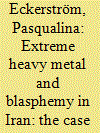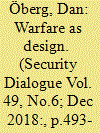|
|
|
Sort Order |
|
|
|
Items / Page
|
|
|
|
|
|
|
| Srl | Item |
| 1 |
ID:
188958


|
|
|
|
|
| Summary/Abstract |
Since the revolution in 1979, the Islamic Republic of Iran has imprisoned musicians, especially punk, hip-hop, and hard rock bands, as well as those playing heavy metal subgenres. Extreme heavy metal artists and fans emerged in the 1990s. The government soon targeted them as Satanists and began a systematic crackdown on metalheads. The metalcore band Confess is the most well-known case. The band was arrested in 2015 on counts of blasphemy, disturbing public opinion through the production of music, participating in interviews with the opposition media and propaganda against the Islamic Republic of Iran, among other charges. The majority of secular countries today do not consider extreme heavy metal to be transgressive. This is not the case in contexts where religious traditions have a significant influence on society. By analysing the narrative of the band Confess, the purpose of this paper is to provide an understanding of how Iranian extreme metal musicians resist religious oppression, challenge their government, religious precepts, and social values through their music.
|
|
|
|
|
|
|
|
|
|
|
|
|
|
|
|
| 2 |
ID:
176495


|
|
|
|
|
| Summary/Abstract |
Edward Snowden exposed the discrepancy between the official US defence discourse of liberal values in cyberspace and secret surveillance and cyber exploitation practices. Situated in the critical literature on security and surveillance, the article proposes that more attention needs to be paid to the constitutive role of transgressive practices for security communities. The article introduces a Lacanian strategy for studying transgression in the US cyber defence community. Through this strategy, a transgressive other – in this case, China in cyberspace – enters the fantasy of the US cyber defence community as the symptom that conceals more fundamental tensions in the US cyber defence. But the community's representation of China in cyberspace represents more than that; China is a fantasmatic object that structures and gives content to a desire for transgressing the official ideals of the US cyber defence. This is why the excessive cyber practices that China is criticised for conducting mirror the secret, disavowed transgressions of the US cyber defence. Transgressions, the article concludes through Lacan, provide the necessary (partial) enjoyment that sustains the US cyber defence community as a solidarity-in-guilt and the official US cyber defence discourse.
|
|
|
|
|
|
|
|
|
|
|
|
|
|
|
|
| 3 |
ID:
162416


|
|
|
|
|
| Summary/Abstract |
This article argues that the politics of contemporary Western warfare finds an important reference point in discourses on military design. In the 2010s, military design has become a trending topic in military discourses on command and planning methodology. Since Clausewitz, warfare has been considered a phenomenon characterized by a tension between creativity and linear planning, and the ideal commander as someone with the vision to overcome this. By mapping and analyzing tactical, operational, and strategic narratives and practices, the article illustrates how they emphasize a warfare based both on experimentation and artistry and on traditional operational planning. In so doing, military design relies on reductive military concepts to push the tension identified by Clausewitz towards its extreme end-point, idealizing creativity as an objective of warfare. The article ends by asking to what extent military design risks spilling over into other dimensions of social and political life. It concludes that in pushing creativity as part of war, military design builds on and justifies transgressive political practices with the risk of becoming a vital aspect of future governing.
|
|
|
|
|
|
|
|
|
|
|
|
|
|
|
|
|
|
|
|
|